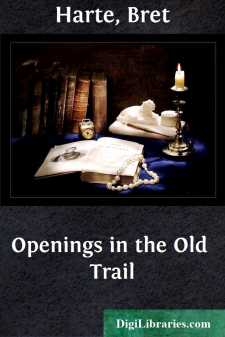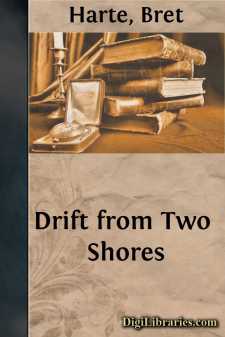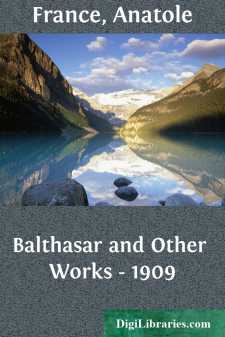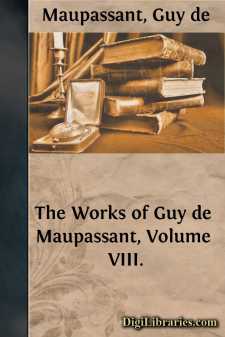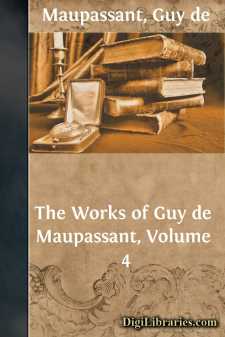Literary Collections
- American 84
- Ancient, Classical & Medieval 14
- Asian 1
- Australian & Oceanian 1
- Canadian 55
- Continental European 121
- English, Irish, Scottish, Welsh 179
- Essays 160
- General 24
- Letters 46
- Middle Eastern 1
Literary Collections Books
Sort by:
by:
Bret Harte
A MERCURY OF THE FOOT-HILLS It was high hot noon on the Casket Ridge. Its very scant shade was restricted to a few dwarf Scotch firs, and was so perpendicularly cast that Leonidas Boone, seeking shelter from the heat, was obliged to draw himself up under one of them, as if it were an umbrella. Occasionally, with a boy's perversity, he permitted one bared foot to protrude beyond the sharply marked...
more...
by:
Bret Harte
THE MAN ON THE BEACH He lived beside a river that emptied into a great ocean. The narrow strip of land that lay between him and the estuary was covered at high tide by a shining film of water, at low tide with the cast-up offerings of sea and shore. Logs yet green, and saplings washed away from inland banks, battered fragments of wrecks and orange crates of bamboo, broken into tiny rafts yet odorous...
more...
Grateful acknowledgment for permission to include the stories and other material in this volume is made to the following authors, editors, publishers, and copyright holders: To The Pictorial Review Company and Miss Edwina Stanton Babcock for permission to reprint "The Excursion," first published in The Pictorial Review; to The Century Company and Mr. Thomas Beer for permission to reprint...
more...
INTRODUCTION I was talking the other day to Alfred Coppard, who has steered more successfully than most English story writers away from the Scylla and Charybdis of the modern artist. He told me that he had been reading several new novels and volumes of short stories by contemporary American writers with that awakened interest in the civilization we are framing which is so noticeable among English...
more...
"After all," Count d'Avorsy said, stirring his tea with the slow movements of a prelate, "what truth was there in anything that was said at Court, almost without any restraint, and did the Empress, whose beauty has been ruined by some secret grief, who will no longer see anyone and who soothes her continual mental weariness by some journeys without an object and without a rest, in...
more...
by:
Anatole France
In those days Balthasar, whom the Greeks called Saracin, reigned in Ethiopia. He was black, but comely of countenance. He had a simple soul and a generous heart The third year of his reign, which was the twenty-second of his age, he left his dominions on a visit to Balkis, Queen of Sheba. The mage Sembobitis and the eunuch Menkera accompanied him. He had in his train seventy-five camels bearing...
more...
The most robust and masculine of recent French novelists is a typical Norman, sprung from an ancient noble family, originally of Lorraine, but long settled in the Pays de Caux. The traveler from England towards Paris, soon after leaving Dieppe, sees on his left hand, immediately beyond the station of St. Aubin, a handsome sixteenth-century house, the Château de Miromesnil, on a hill above the railway....
more...
OF "THE NOVEL" do not intend in these pages to put in a plea for this little novel. On the contrary, the ideas I shall try to set forth will rather involve a criticism of the class of psychological analysis which I have undertaken in Pierre et Jean. I propose to treat of novels in general. I am not the only writer who finds himself taken to task in the same terms each time he brings out a new...
more...
The first aim of art, no doubt, is the representation of things as they are. But then things are as our eyes see them and as our minds make them; and it is thus of primary importance for the critic to distinguish the precise qualities of the eyes and minds which make the world into imaginative literature. Reality may be so definite and so false, just as it may be so fantastic and so true; and, among...
more...
Count Eustache d'Etchegorry's solitary country house had the appearance of a poor man's home, where people do not have enough to eat every day in the week, where the bottles are more frequently filled at the pump than in the cellar, and where they wait until it is dark before lighting the candles. It was an old and sordid building; the walls were crumbling to pieces, the grated, iron...
more...


